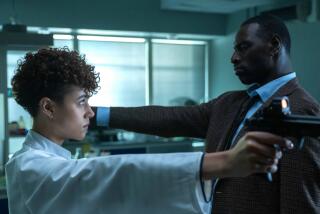MOVIE REVIEW : Martial Arts Period Epics Tell a Tale of Two Chinas : Rousing ‘Once Upon a Time in China’ and its sequel, ‘The Last Action Hero,’ raise issues of national sovereignty and cultural identity.
- Share via
Tsui Hark’s “Once Upon a Time in China” (at the Monica 4-Plex), a martial arts epic directed and co-written by a master of the genre, is said to be the 99th retelling of the exploits of Wong Fei-hung. This actual historical figure, a Canton physician and a proponent for Chinese independence, became a folk hero in the late 19th and early 20th centuries.
As a period action picture, this Golden Harvest production has everything: a DeMillean sense of spectacle; dazzling displays of martial arts combat; handsome, meticulously detailed production design; superb color cinematography; a rousing score and an affable hero in Jet Lee’s Wong. Made in 1991, it spawned two sequels, after which Lee broke with Tsui Hark. Lee then went to another studio to make yet another sequel of “Once Upon a Time in China,” the brand-new, entertaining “The Last Hero in China” (at the Garfield Theater, Valley Boulevard and Garfield Avenue, Alhambra).
Wong’s clinic-cum-martial-arts academy is located in Canton at a time when foreign incursions into China are escalating rapidly, corrupting its government and exploiting its people. To combat this tendency Wong, at the beginning of “Once Upon a Time in China,” has assembled a small band of loyal followers into a local militia. It is constantly running afoul of the new commander of the regional army, who perceives a threat to his authority--and to his lucrative relationships with the foreigners, especially the Americans, busily engaged in luring impoverished Chinese into virtual slavery with promises of riches in California’s gold fields.
Typically, Hong Kong action pictures, contemporary as well as period, combine derring-do and bloodshed with the broadest of comedy, and this film is no exception. What is exceptional lies in Hark’s ability to depict comic-book adventures with the utmost visual panache. Wong and his rambunctious, rowdy band emerge as simple, uncomplicated men whose cause nevertheless raises complex, contradictory issues of national sovereignty and cultural identity that are as timely for China today as they were a century ago.
Wong is, of course, militantly ethnocentric, yet his attitudes are challenged at every turn, especially by an attractive relative by marriage (Rosamund Kwan), who has just returned from abroad in her proper Victorian attire and with a camera, intent on photographing everything in sight. Why, Wong wonders, must China adopt foreign ways and inventions--to which she replies that China will otherwise be “left behind.” Hark evokes the notion of a China of necessity caught up in a perpetual balancing act, taking from the West whatever is beneficial yet striving to remain determinedly Chinese and assertively independent.
It would be a mistake to take this lively, endlessly fresh and inventive entertainment (Times-rated Mature for standard martial arts violence) as an anti-American diatribe. Hark is only dramatizing history--and doesn’t even include some of Britain and America’s worst sins, most notably their crucial role in promoting the opium trade.
“The Last Hero in China,” written and directed by Wang Ching, is not as complex or as substantial as “Once Upon a Time in China” but it’s just as much fun. This time out Wong is opening a new branch of his martial arts academy, not realizing he has moved next door to a brothel, whose prostitutes immediately attempt to distract his pupils.
On a more serious note, some evil monks have become white slavers, abducting young women for shipment to Southeast Asia, and a foreign devil, a Westerner, is profiting from selling a patent medicine that has left numerous Chinese children deaf. With razzle-dazzle martial arts sequences directed by Yuan Woo-ping, “The Last Hero in China” (Times-rated Mature for standard martial arts violence) moves like lightning yet its burlesque humor deftly gives way to moments of unexpected poignancy.
‘Once Upon a Time in China’ Jet Lee: Wong Fei-hung Rosamund Kwan: Aunt Yee Yuen Biao: Fu Jacky Cheung: Buck Teeth
A Rim Film Distributors release of a Golden Harvest production. Producer-director Tsui Hark. Executive producer Raymond Chow. Screenplay by Tsui Hark, Yuen Kai Chi, Leung Yiu Ming and Tang Pik Yin. Cinematographers Chung Chi-man, Bill Wong, Arthur Wong, Lam Kwok-wah, Chan Kwok-on. Editor Mak Chi-sin. Music James Wong. Art director Hai Chung-man. In Cantonese, with English and Chinese subtitles. Running time: 1 hour, 50 minutes.
Times-rated Mature (standard martial arts violence).
‘The Last Hero in China’ Jet Lee: Wong Fei-hung Cheung Way-kin: Ah So (Buck Teeth) Leung Ja-yan: Ah Fu Cheung Man: Miss Tee
A World Entertainment release of a Win Studio production. Writer-director Wong Ching. Martial arts director Yuan Woo-ping. Executive producer/producer Jimmy Heung. Cinematographer Ma Choi-sing. Costumes Au Ding-ping. Editor O Kim-to. Music James Wong. Art director Mok Siu-key. Set designer/decorator Tony Wong. Sound Lu Chow-tak.In Cantonese, with English and Chinese subtitles. Running time: 1 hour, 45 minutes.
Times-rated Mature (standard martial arts violence).
More to Read
Only good movies
Get the Indie Focus newsletter, Mark Olsen's weekly guide to the world of cinema.
You may occasionally receive promotional content from the Los Angeles Times.









